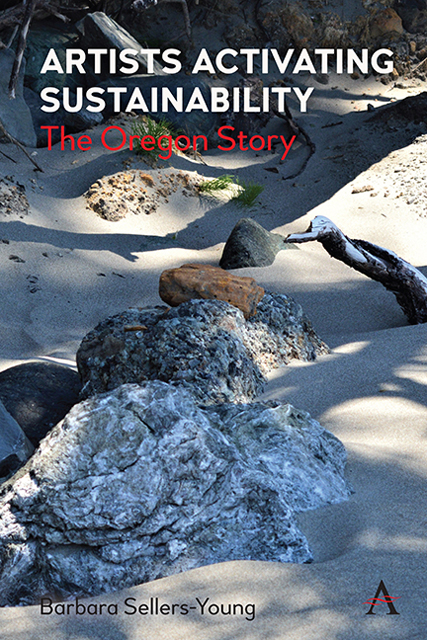Book contents
- Frontmatter
- Dedication
- Contents
- Acknowledgments
- List of Figures
- Introduction: Art, Environment and Metaphor
- 1 Environmental Activism, Arts and the Land of Eden Landscape One: High Desert Basin and Range
- Landscape One High Desert Basin and Range
- Landscape Two Columbia Gorge and Plateau
- Landscape Three Cascade Range
- Landscape Four The Willamette Valley
- Landscape Five Rogue River Valley
- Landscape Six Oregon Coast and Coast Range
- Index
10 - Ashland: Angus Bowmer and the Oregon Shakespeare Festival
Published online by Cambridge University Press: 10 January 2023
- Frontmatter
- Dedication
- Contents
- Acknowledgments
- List of Figures
- Introduction: Art, Environment and Metaphor
- 1 Environmental Activism, Arts and the Land of Eden Landscape One: High Desert Basin and Range
- Landscape One High Desert Basin and Range
- Landscape Two Columbia Gorge and Plateau
- Landscape Three Cascade Range
- Landscape Four The Willamette Valley
- Landscape Five Rogue River Valley
- Landscape Six Oregon Coast and Coast Range
- Index
Summary
Civic entrepreneurship is the free contribution of time and effort to a project for the greater good of society without expectation of financial benefit. Self-expression, opportunity for creativity and to give back to the community is the motivation; reputation is the reward and social capital is the byproduct.
Henry EtzkowitzAngus Bowmer (1904–1979), founder of the Oregon Shakespeare Festival, in his biography As I Remember Adam, describes his years growing up as a member of a musical family engaged in the country newspaper business in which his grandfather started 16 newspapers throughout the Pacific Northwest. His grandfather's process as Bowmer describes it was to move into an area with an old press and immediately through the newspaper start advocating for a new road or “some other project which would bring the community together in support of the common good.” Eventually, the newspaper's advocacy became a factor in new businesses starting up as people begin to develop an identity as a community. “The citizenry would take on a feeling of pride in the identity of their community. New folk would move in, houses would be built and there would emerge a new town.” The establishment of a new town was the signal to Bowmer's grandfather to pack up and move on to the next place.
Bowmer learned from his grandfather an approach in which cultural institutions, such as a newspaper, could be the creative force in a community. It was an approach he would use in 1935 to establish the Oregon Shakespeare Festival in the small town of Ashland in southern Oregon. The difference between Bowmer and his grandfather is that Bowmer stayed in Ashland and set a public engagement in motion that would create a theater enterprise that in 2021 would cover four acres of Ashland in three theaters with an annual audience of 400,000, employ 675 and have an annual budget of 30 million dollars. His efforts resulted in Ashland, a small community of approximately 21,000, to be the site of one of the largest regional theaters in the United States and the home of the most noted performing arts institution in Oregon. Bowmer's initiative is an example of what business researcher Henry Etzkowitz refers to as civic entrepreneurship in which there is alignment between humanistic, social and commercial entrepreneurship.
- Type
- Chapter
- Information
- Artists Activating SustainabilityThe Oregon Story, pp. 169 - 184Publisher: Anthem PressPrint publication year: 2022

